2012, A New Year
-- New Years post #2: sustainability and energy
-- New Years post #3: How about more community self-help? (Peter Riehle and Eastern Market Metro Plaza)
-- New years post #4: How to Keep Resolutions and change behavior
-- New years post #5: DC City Council Committees and striving to be a world class city
-- New years post #6 -- the crazy thing about U.S. zoning is that it's not designed to maximize overall land value
-- New Years post #7: Anacostia and sustainable economic development and revitalization
-- New years post #8: Shattering the myths of sustainability
One of the legitimate criticisms of my blog entries is that they are too detailed and complete and ask for too much. Most people can't fully grasp even one idea, let alone 20 ideas.
So for 2012, I'm going to lay out the five to seven most important items and leave it at that.
1. The City and its leadership, including the Washington Post editorial page, should commit to supporting, encouraging, and enabling substantive public participation, democracy, and civic engagement.
For the Post, that means treating citizens and public processes in the city with the same respect they treat protesters in Tahrir Square in Egypt, Russia, and other "foreign" countries.
It means instead of constantly suggesting through editorials that civil society be constrained, instead put forward proposals that enable and strengthen civic involvement through capacity building and the creation of robust open and transparent processes that are citizen-centered.
For the executive and legislative branches of the city, it means according citizens the respect that their position in democracy warrants--government derives from the people--and thereby reorienting practices and policies that respect citizens, including:
a. opening up information instead of forcing citizens to file FOIA requests;
b. scheduling public meetings in places that are convenient to get to and Metro accessible for a majority of the citizenry;
c. developing a robust protocol for District/neighborhood planning (comparable to sector and neighborhood conservation district planning in other jurisdictions in the region) that defines citywide and neighborhood objectives, and works to make them more congruent;
d. developing a robust capacity building infrastructure that supports civic engagement and community organizations (like the training infrastructure of the Minneapolis Neighborhood Revitalization Program and the Massachusetts Citizen Planner Training Collaborative, the "Government 101" programs offered by many cities, and , the Urban Information Library at the main branch of the Dallas Public Library).

2. The Washington Post needs to run more local news.
In the Metro section on Friday, one of the key articles was about how someone who went to the University of Maryland is running for Congress--IN CALIFORNIA!
So what. It's not a story relevant to us in terms of the region's local news, so it's not a Metro section story.
In looking at Post articles, issues, and sections from decades ago, far more local news ran in the paper, stories about neighborhoods and developments. Now, very little of that kind of coverage seems to be running in the paper.
While traveling last week, I came across an article, "Durham architect Freelon named to national arts commission," in the Raleigh (NC) News & Observer about architect Phil Freelon of Durham being appointed to the US Commission of Fine Arts--the body in DC that weighs in on urban design in the city as it relates to the federal interest--and I was thinking that this is an appropriate "local news story" for the Washington Post, because the CFA is an important local body, making decisions that shape the city for decades to come. Yet, I expect we'll never see such a story in the "local" paper.
Granted the Post covers the metropolitan area, and DC proper is only the third or fourth largest submarket for the paper--Fairfax, Montgomery, and Prince George's County have more subscribers, and at least in the days of the go-go real estate market, much of the real estate section advertising came from the outlying areas, I know that the "city's" major metropolitan area has a lot more to cover than in the "old days" when the city made up the bulk of the region's population and activity.
Still, without reading the local community papers--the Gazette papers in Maryland (owned by the Post actually), the Current newspapers in DC, the Connection papers in Northern Virginia--it's almost impossible to get a sense of what's happening in the Metro area or DC by relying on the Washington Post.
I know that the digital information revolution has completely changed the role of newspapers as primary media, but if the paper doesn't cover the local region, it ends up having no real anchor, because increasingly, "national" news, or the coverage of the federal government is being supplanted by specialized publications like Politico.
Digital media entries aren't enough--the Post has journalist-bloggers covering the local jurisdictions--articles need to run in the paper, because otherwise the articles aren't retained and indexed for posterity.
3. Rather than spend so much time on achieving "statehood" maybe the Executive and Legislative branches ought to be focused on making the city be great in the here and now--a "city on the hill," where the city's achievements would be seen as supporting evidence for statehood claims, rather than blaming prevailing mediocrity as the product of lack of self-determination.
4. The organization of City Council should probably be changed.
a. Make it a part time legislative body truly;
b. By cutting the salaries to about $60,000 from $130,000 currently ("D.C. Council members bring in second-highest salaries among big cities" from the Examiner);
c. Increase the size of the body (I go back and forth about this) to 24 members + the Council Chair -- it's 12 members + the Council Chair currently -- to 2 members for each Ward and 8 At-Large members;
It seems counter-intuitive, but adding more members will make elected office more competitive, because the winner take all system advantages incumbents and the dominant party, in this case the Democratic Party, stultifying the political environment in ways that are truly deleterious to local government and civil society.
It will also make it harder to pass legislation -- 13 members will be required to pass legislation instead of 7 members now. This would add a level of discernment and a kind of check that isn't in place now ("Is D.C. overgoverned? Or undergoverned?" from the Post).
6. DC should create robust master transportation and parks and recreation plans for the city, and transform its planning processes to engage and educate the citizenry.
I've written plenty on that over the years. This link lists a bunch of entries on parks planning and the connection between parks planning and quality of life.
Labels: electoral politics and influence, media and communications, participatory democracy and empowered participation, provision of public services, urban design/placemaking, urban revitalization







0 Comments:
Post a Comment
<< Home